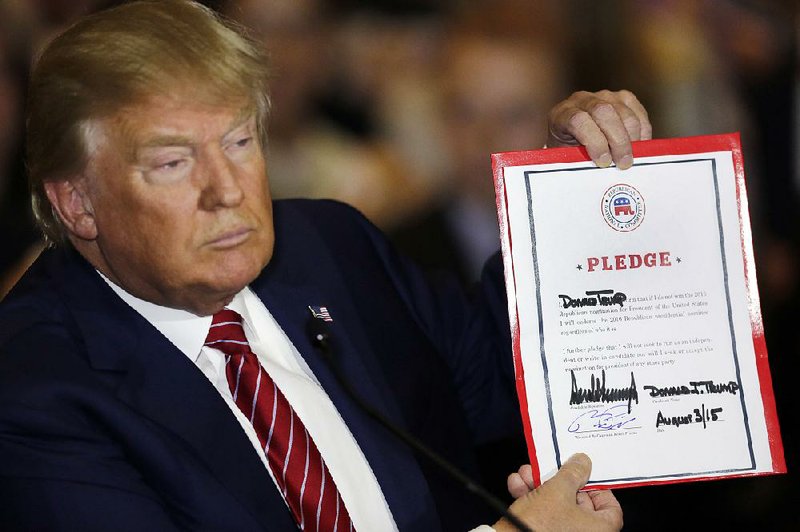WASHINGTON -- Presidential candidate Donald Trump on Thursday ruled out the prospect of a third-party White House bid and vowed to support the Republican Party's nominee -- whoever it may be.
The billionaire businessman announced his decision in a news conference at Trump Tower, the gold-hued skyscraper in midtown Manhattan where he began his campaign for president.
"I have signed the pledge," Trump said, adding that he intends to win the nomination and face whomever the Democrats nominate.
"So, I will be totally pledging my allegiance to the Republican Party and the conservative principles for which it stands, and we will go out and we will fight hard and we will win," he said.
In the GOP debate on Aug. 6 in Cleveland, Trump refused to rule out a third-party run if he fell short, though he has since signaled a possible change of heart as some state parties are requiring loyalty oaths as a condition of appearing on primary ballots.
He since has been intensely lobbied by Republican National Committee leaders, who have struggled to rein in the former reality TV star. Trump announced his decision shortly after meeting privately with committee Chairman Reince Priebus.
Fellow candidate Sen. Rand Paul of Kentucky, who angrily challenged Trump at the debate, took credit for what he termed Trump's "capitulation."
"I spent the last few weeks making sure people knew it was not acceptable to potentially throw the next election to Hillary," Paul wrote on Twitter, referring to Democratic candidate Hillary Rodham Clinton.
The decision puts an end -- for now -- to the nervousness felt inside the GOP about the prospect of Trump holding firm and keeping his options open. At the debate, he said that gave him "a lot of leverage."
The pledge is not legally binding. Trump always could change his mind, particularly if GOP establishment leaders take aggressive steps to thwart his candidacy in the coming months.
"I see no circumstances under which I would tear up that pledge," Trump said Thursday.
There were no doubts about the intentions of the GOP's other major presidential contenders headed into the debate, and they quickly lined up Thursday to sign.
"The RNC clearly felt it had to box Trump into a decision," said Doug Watts, a spokesman for fellow candidate and retired surgeon Ben Carson. "We just sort of shrugged our shoulders, and that's the end of that."
A third-party bid by Trump could harm the GOP's efforts to take the White House after eight years of Democratic President Barack Obama. He leads the Republican field in what are still very early polls.
Republican National Committee officials had been working with Trump's campaign to avoid such a scenario. In recent days, Trump hinted the lobbying was beginning to work. "I think a lot of people are going to be very happy," he said Saturday in Tennessee.
The committee's pledge asks candidates to promise to "endorse the 2016 Republican presidential nominee regardless of who it is." Further, it asks them to pledge "that I will not seek to run as an independent or write-in candidate, nor will I seek or accept the nomination for president of any other party."
The one-page pledge is not a legal contract or binding. Rather, it is a political document and a symbol of Republican fealty.
"It is, more than anything, your word," GOP candidate and former technology executive Carly Fiorina said Thursday on CNN's New Day. "And I would presume that somebody running for president would like to signal to the American people, and most especially right now to Republican primary voters, that their word can be trusted."
Former Republican National Committee chairman Jim Gilmore, who is one of 17 GOP presidential candidates, said he supports the national party's push for candidates to pledge loyalty.
"If someone is going to go to the party and ask for their support, if they're going to ask the rank and file for their vote, that comes with an obligation for loyalty, in my mind," said Gilmore, a former Virginia governor. "Generally speaking, if you want the party's support, that loyalty should be there."
Information for this article was contributed by Steve Peoples of The Associated Press and by Robert Costa and Philip Rucker of The Washington Post.
A Section on 09/04/2015

